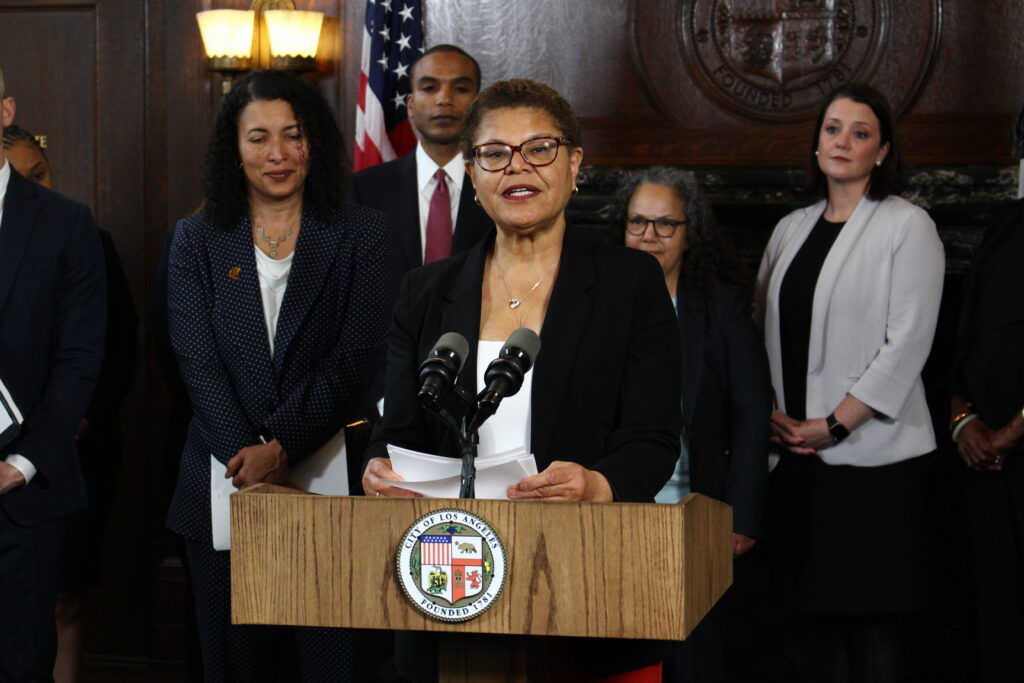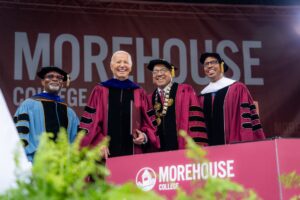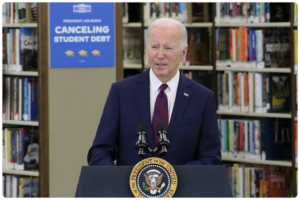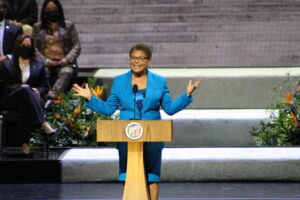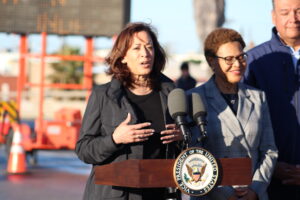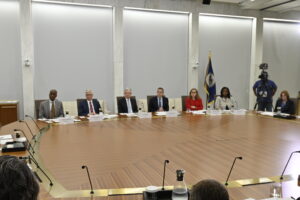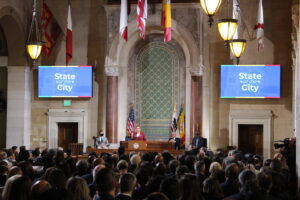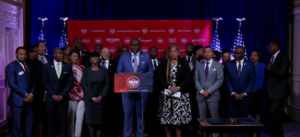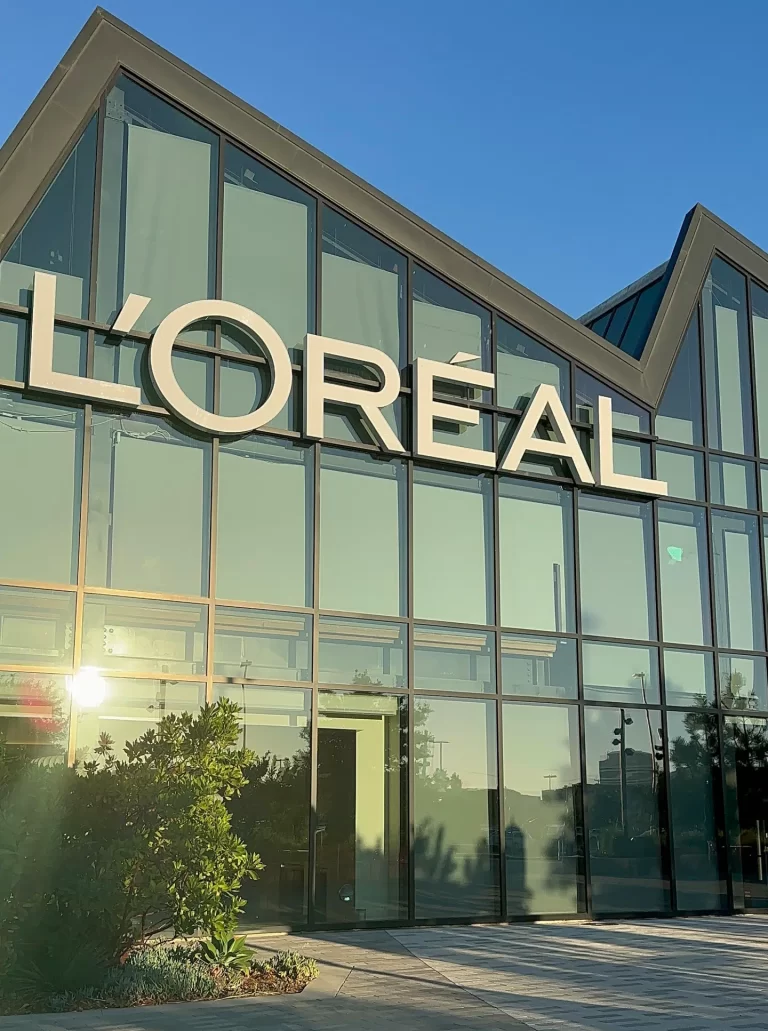Mayor Karen Bass Releases Her First Proposed City Budget
Fresh from delivering her first-ever “State of the City” address, Los Angeles Mayor Karen Bass unveiled her first city budget for fiscal year 2023-2024. Last night’s speech detailed insight into how the budget will be in alignment with her vision for a “New LA” outlining how to make Los Angeles stronger, healthier, happier and safe.
The proposed budget reflects the city’s most pressing needs. With unprecedented investments to dramatically reduce homelessness and improve public safety while being fiscally responsible with strong reserves to address uncertainties in the year ahead.
The budget also accounts for all city departmental programs such as building and safety, policing, tourism, cannabis regulation, cultural affairs, economic and workforce development neighborhood empowerment.
Mayor Karen Bass released her first proposed City budget which includes nearly $1.3 billion, an unprecedented investment to build housing and confront the homelessness crisis. The budget also includes bold initiatives to improve public safety.
“This budget is a reflection of our values and invests in the most critical needs of our city,” said Mayor Bass. “The goal is to make both big changes and to chart a course of sustainable change. With 40,000 people unhoused in our city, and with the size of our police department possibly dropping to 2002 levels, we must take bold action – and that’s what this budget is – a real, sustainable plan for change and a new direction for a Los Angeles that is stronger, healthier, happier and safer.”
The next day immediately following her “State of the City” address, the Mayor reiterated that she can not say the state of the city is strong when there are more than 40,000 people unhoused. Her proposed budget makes unprecedented investments to dramatically reduce homelessness. With nearly $1.3 billion allocated for homelessness and housing, $250 million will be directed towards Inside Safe which further breaks down into:
$110 million for motel rooms/temporary housing
$62 million for services (case management, moving people to permanent housing, food, support services)
$47 million for buying hotels and motels
$21 million for permanent housing – includes transition and set up of permanent housing, 12 months of rental assistance
$10 million for staff – including directors and property managers, administrative funding for services providers
The budget also funds the newly established Office of Housing & Homelessness Solutions within Mayor Bass’ Administration that coordinates strategic housing and homelessness initiatives. This allows for the direct hiring of 13 outreach teams within Mayor Bass’ Administration to be trained and deployed in support of Inside Safe.
The Mayor leading the way with compassionate care is a great reminder that her time in the medical field is of great benefit to those suffering from the self-inflicted wounds the city imposed upon its most marginalized residents. If there is to truly be a new Los Angeles, Mayor Bass is displaying an exemplary model for local leaders within the city to follow. This should be replicated throughout every facet of society. Her Street Medicine Teams budget would receive $4 million to fund four medical teams serving 5,600 people. Half of this funding is provided by a Homeless Housing Assistance and Prevention Grant. In order to pay for treatment beds to aid those suffering from substance abuse and other mental health issues, $23.5 million in funding will come from the projected tobacco settlement ($11.8 million) and opioid
settlement ($11.7 million) suits that the City expects this year.
In November 2022, Los Angeles voters approved ballot measure ULA to provide ongoing revenue dedicated to addressing – and ultimately ending – housing insecurity and homelessness in the City. Measure ULA mandates specific programs to increase the production and preservation of affordable housing, and to expand homelessness prevention programs throughout Los Angeles. Measure ULA establishes a transfer tax of 4 percent on the sale of property valued over $5 million and 5.5 percent on property sales valued over $10 million. The proposed budget lays out Mayor Bass’ vision by responsibly allocating $150 million out of the total collections projected for measure ULA. The budget also allocates a responsible $150 million in ULA funds. The City would utilize up to $150 million in federal reimbursements allocated to the City to satisfy any repayment obligation if the litigation is successful which breaks down to:
-
-
$62 million for acquisition and rehabilitation of housing
-
$20 million for short term emergency assistance for tenants
-
$25 million in income support for rent burdened at risk seniors/people with disabilities
-
$25 million for eviction defense
-
$6 million for tenant outreach
-
$12 for tenant protection from harassment
-
Of course, the number one job of any mayor is to keep its residents safe, but Mayor Bass is pointing out a deficient in the staffing of police officers nearing low levels not seen since 2002 with less than 9,000 officers currently on the force. This is due to calls from community activists calling for the defunding of police which resulted in LAPD having to cut its budget by $150 million and redirect spending into communities of color-a decision made in 2020 after the George Floyd incident.
The budget allots funding to bring LAPD to a year-end staffing level of 9,504 officers, supporting the hiring and training of new officers and also provides funds to bring back recently retired officers to the Department for up to 12 months.
The budget also increases staffing at the Personnel Department to streamline, simplify, and speed up the application for candidates, including $1 million for public safety recruitment at the Personnel and Police Departments. To recruit more officers, the City is implementing a sworn hiring incentive that provides bonuses of up to $15,000 for new officers and officers joining LAPD from other departments.
The budget goes on to provide funding to hire civilians to replace officers at desks and to move those officers to the field. This includes hiring Police Service Representatives to improve 911 response times, Detention Officers to move sworn officers out of the jail operations, and Property Disposition Coordinators to have civilians manage property.
-
LAFD
-
$21 million in funding provided for five Drill Tower classes of 60 recruits, for a net increase of 100 above the projected attrition level
-
Emergency Appointment Paramedic Program
-
-
Mayor’s Office of Community Safety
-
GRYD: increases funding from $28 million to $41 million
-
Summer Night Lights: funding to continue at 43 sites
-
CIRCLE Teams: continued funding for 7 existing teams
-
DART (Domestic Abuse Response Teams): increases funding of approximately $1 million (to $3.7 million), which nearly doubles the number of DART advocates at LAPD divisions with the highest call volumes.
-
COMMUNITY INVESTMENTS TO ADDRESS POVERTY AND INCOME INEQUALITY
The Mayor claims she is all for the promotion of local, small, minority, and women-owned businesses for opportunities to work with the City, but the Cabinet focusing on contracting and registering vendors to bid on proposals is still under-developed. She announces that Los Angeles is open for business, but progress connecting more diverse-owned business partnerships has not made any noteworthy progress.
-
$5 million to continue refurbishment of childcare centers so they can reopen
-
Increases funding for senior meals from approximately $9 million to $18 million.
-
Increased one-time contractual services funding of $6.35 million for the Community Investment for Families Department to fund supportive services for the 16 Family Source Centers, including $200,000 for each center to provide short-term emergency housing assistance.
-
$4.6 million to continue the Solid Ground Homeless Prevention Program
SUSTAINABILITY
-
Add 2,400 trees to the watering plan for total of 7,200 trees
-
$1 million to add a crew to remove 2,700 dead trees or stumps (increase of 900 from previous year)
-
$2 million to support trimming of 5,000 more trees
INFRASTRUCTURE
-
In addition to required $36 million for sidewalk repair, this budget adds $28 million for additional repairs and doubles funding for access ramps to $20 million.
-
$8 million for bus shelters in underserved communities









